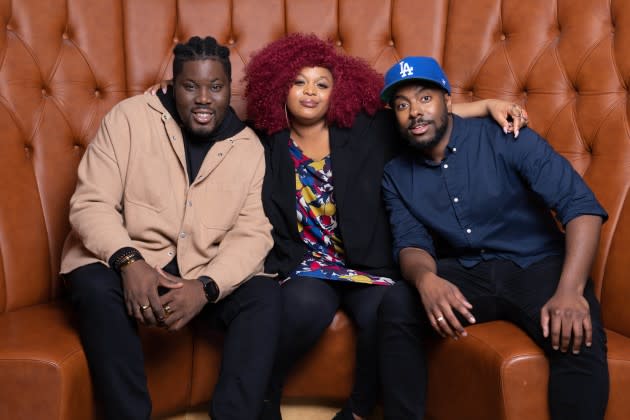Despite Industry Slowdown, BBC Diversity Boss Says Representation Can Keep Improving

EXCLUSIVE: Despite the current slowdown, the BBC’s creative diversity boss is confident representation in UK TV can keep heading in a positive direction.
Speaking to Deadline exclusively upon the announcement of a new 25% diversity target for all BBC shows, Jessica Schibli, who has been in post 12 months, said she takes confidence from the fact that representation has improved year-on-year since 2021 even as slowdown and recession have set in.
More from Deadline
Concerns have been raised anecdotally over the past few months that the industry’s diversity push will be hard hit by the slowdown, with the freelancers exiting and indies closing coming from less traditional backgrounds. Speaking at the Edinburgh TV Festival late last month, a host of leading TV execs acknowledged with little apology that there are too many production companies, including the BBC’s own Dan McGolpin, who said: “There aren’t enough money and hours to keep everyone alive.”
But Schibli was bullish that this tectonic shift won’t adversely affect people from non-traditional backgrounds. “We see our role in supporting indies,” she said. “One thing that gives me real reassurance is the fact that year on year our [diversity] numbers are getting better. So we know that despite what is happening in the wider market, we have made brilliant progress in creative diversity.”
She was speaking to us as the BBC upped its target for the proportion of people working on a show who should be ethnically diverse, deaf, disabled and / or neurodivergent, or from a socioeconomically diverse background, from 20% to 25%. The thinking behind the new 25% target, Schibli revealed, is bringing the figure into line with the BBC’s highest internal staff diversity target for these characteristics, which is for people from socioeconomically diverse backgrounds.
Simultaneously, the BBC yesterday said it has spent £243M ($318M) across the 36 months from April 2021 on shows that met its separate criteria for diverse content, doubling its initial target. The BBC has pledged to keep this spend steady over the next three years at £240M for shows that meet two of these three criteria: ‘Diverse stories and on-screen portrayal’, ‘diverse production leadership’ and ‘diverse company leadership’. Best-in-class examples include the likes of Dreaming Whilst Black, which is produced by Big Deal Films for the BBC, A24 and Showtime, Rose Ayling-Ellis: Signs for Change, which featured a number of deaf people in behind-camera roles, or the BAFTA-winning Black Ops.
Aligning on-screen with off-screen

Schibli said the big challenge now is for shows that deliver “landmark portrayal” on-screen to be combined with greater diversity off-screen in senior production roles or via diverse leadership of the companies producing the content. In effect, too many diverse shows are being created by people from traditional backgrounds.
“This has been one of our biggest insights and learnings,” added Schibli. “Our real focus now is aligning strong on-air portrayal with senior production roles. We need to have bold upfront conversations at the point of commission, saying who we are crewing up and bringing [diverse people] into those senior roles.”
To aid with the push, Schibli revealed she is chairing a pan-broadcaster working group seeking to strengthen support for diverse-led production companies. “We need to think how we can develop talent that is underrepresented in senior leadership roles that influence creative output,” said Schibli, whose creative diversity team reached out to the UK’s production sector yesterday afternoon and will host briefing sessions and a series of events over the coming year to help spread the message.
With this in mind, the team hopes to satisfy the Sir Lenny Henry Centre for Media Diversity’s first recommendation from its report that partnered yesterday’s BBC diversity targets, which said “any new commitment criteria need to support the development of diverse leadership and, more specifically, diverse company leadership.”
Other recommendations include better communication, more effective and transparent diversity monitoring and the systematic review of new metrics “with as much granular detail on the protected characteristics as possible.”
The centre also called for additional ring-fenced funding for diverse content beyond the £240M three-year spend, but this has not been taken up by the BBC beyond a small development pot of £2.3M.
“We are looking to embed diversity and inclusion into the commissioning process rather than being siloed or seeing it as an add-on,” said Schibli. “We need to think about it in a way that doesn’t silo out different characteristics, looking at intersectionality.”
Defining the working classes

Speaking of intersectionality, Schibli said she is working across industry with partners on the task of better defining socioeconomic diversity, coming after James Graham’s MacTaggart address raised the difficulty of clarifying what it means to be working class in 2024 as working class representation in UK TV hits disastrous lows.
The BBC’s current definition takes into account areas like schooling, benefits and parental occupation, and Schibli said she is actively looking into this with colleagues from across the industry.
“We are on a journey when it comes to socioeconomic diversity and I am looking to see that definition evolve as well,” she added. “James said it’s a culture, so the question becomes, ‘How do you measure a culture?’.”
Best of Deadline
Jenna Ortega's Career So Far: 11 Movies And TV Shows Starring The 'Beetlejuice Beetlejuice' Actress
Hollywood & Media Deaths In 2024: Photo Gallery & Obituaries
TV Cancellations Photo Gallery: Series Ending In 2024 & Beyond
Sign up for Deadline's Newsletter. For the latest news, follow us on Facebook, Twitter, and Instagram.
